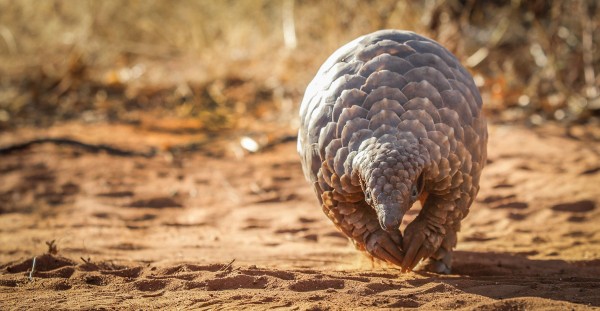Operation Pangolin Launches to Save World’s Most Trafficked Wild Mammal
Researchers begin work ahead of World Pangolin Day on Feb. 18
Researchers and conservationists are embarking on a bold initiative to save the world’s most trafficked wild mammal — the pangolin.
With core-funding support from the Paul G. Allen Family Foundation, Operation Pangolin has launched in Cameroon and Gabon with plans to expand into Nigeria soon. Among the least studied animals in the world, little is known about the natural history or ecology of the world’s eight pangolin species. Even less is known of their role in a significant criminal economy where trafficked pangolins and the illegal sale of their scales and meat often go undetected. Operation Pangolin will generate much-needed data to inform conservation strategies in Central Africa, with global implications for the illicit wildlife trade. The team will then help implement the identified strategies, including wildlife crime prevention, with the hope of expanding their efforts into Asia, the only other continent with native pangolin populations.
“I am honored to be a member of this transdisciplinary team science-based effort that will engage diverse stakeholders in generating new evidence to inform sustainable conservation action,” said Meredith Gore, an associate professor in the University of Maryland Department of Geographical Sciences.
The collaborative research team includes:
- Matthew H. Shirley from Florida International University, focusing on ecological monitoring;
- Alasdair Davies from the Arribada Initiative, focusing on technological innovation;
- Dan Challender from the University of Oxford, focusing on trade and policy;
- Meredith L. Gore from the University of Maryland, focusing on human dimensions of global environmental change;
- Bistra Dilkina from the University of Southern California, focusing on data coalescence and artificial intelligence.
“Without urgent conservation action at a global scale, all eight species of pangolins face extinction,” said Shirley, project lead for Operation Pangolin. “Operation Pangolin is a chance to alter the conservation landscape for pangolins and other wildlife threatened by illicit human behavior.”
The researchers are joining forces with Carla Louise Mousset Moumbolou and her team from the Agence Nationale des Parcs Nationaux (Gabon’s national parks agency) to lead implementation efforts in Gabon and Andrew Fowler and his team from ZSL (Zoological Society of London) to lead implementation in Cameroon. The project is supported by the IUCN Pangolin Specialist Group, a global network of 189 pangolin technical specialists.
The team is developing toolkits for pangolin monitoring and data collection, a critical first step to prevent extinction of these evolutionarily distinct and imperiled mammals. The toolkits will incorporate the latest advancements in hardware and software, while using locally accessible and low-cost technological components. The researchers will work with local conservation stakeholders, including indigenous peoples, local communities and government agencies to deploy monitoring programs, implement conservation interventions and develop predictive tools for addressing wildlife crime.
“Accurate, actionable data is the foundation of effective conservation efforts,” said Gabe Miller, director of technology on behalf of the Paul G. Allen Family Foundation. “Operation Pangolin will provide a blueprint for how conservationists can turn data into solutions that address important issues like wildlife trafficking and the biodiversity crisis head on.”
Both IUCN and the Parties to the Convention on International Trade in Endangered Species of Wild Fauna and Flora (CITES) agree that the development of pangolin-specific monitoring methods linked to anti-trafficking efforts is the highest conservation priority for these mammals. Throughout history, pangolins have been sustainably used for food and medicine, but overexploitation has exploded in recent decades resulting in threatened status for all eight species. The main threat, both in Asia and increasingly in Africa, is poaching for international wildlife trafficking. Enough pangolin scales have been seized in the past decade to account for at least 1 million pangolins, yet little is known of the trafficking supply chains. This number does not account for the pangolins that are removed undetected from the wild to fuel this illegal enterprise. At least 250,000 are estimated to be taken from African and Asian forests every year for consumers in China, Vietnam, and even western Europe and the United States.
The $4 million grant from the Paul G. Allen Family Foundation supports the current launch of the project in Central Africa. The research team is concurrently raising funds in an effort to expand the project to Asia by 2027.
Learn more about Operation Pangolin here.
Photo of pangolin provided by iStock
Published on Wed, 02/15/2023 - 12:46


